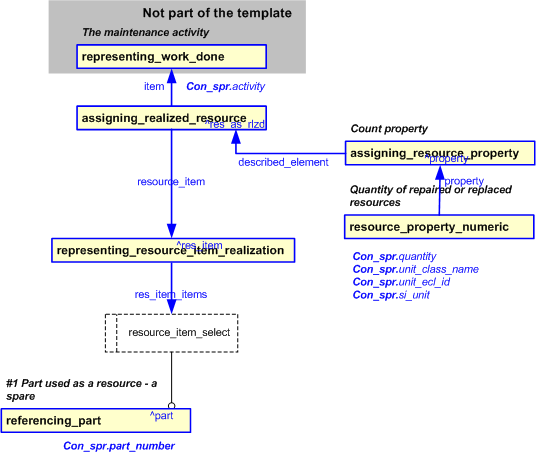Template:— consumed_spare_part (sp_prt)
Context:— MoDAvDEX |
Date: 2008/01/29 11:23:33
Revision: 1.5
|
This section specifies the template consumed_spare_part.
NOTE
The template has been defined in the context of
MoDAvDEX.
Refer to the business context for details of related templates.
NOTE
An explanation of a template and the associated instantiation path is
provided in the
Template overview
section.
This template describes how to represent spare parts used / fitted during a maintenance
activity.
NOTE
This template is used when there is no requirement to track the serialized items or the
positions in which they have been fitted.
The EXPRESS-G diagram in
Figure
1
shows the templates and EXPRESS entities that are required
to represent the template
"consumed_spare_part".
The text highlighted in blue shows the template parameters.
Figure 1 — An EXPRESS-G representation of the Information model for consumed_spare_part
The graphic for the template to be used in other EXPRESS-G diagrams
is shown in Figure
2
below.
Figure 2 — The graphical representation of the consumed_spare_part template
The following input parameters are defined for this template:
The Part Number of the part that was fitted.
The quantity of spare parts consumed.
The class name of the corresponding to the quantity unit.
The following classes and their sub-classes can be used:
The identifier of the
External_class_library
storing the definition of the class referenced by the parameter @unit_class_name.
si_unit (Default=false,Type='BOOLEAN')
Value should be set to true if the unit is a SI base unit defined by ISO, i.e.
kilogram (kg) for Mass,
second (s) for Time,
metre (m) for Displacement,
ampere (A) for Electrical current,
kelvin (K) for Temperature,
mole (mol) for Amount of substance, and
candela (cd) for Luminous intensity. If this is not the case it should be set to false.
The
Activity_actual
representing the work that was done that consumed this resource.
The following reference parameters are defined for this template:
Allow the
Part
entity instantiated in this path to be referenced when this template is used.
Note: The
Part
entity can be referenced in a template path by:
%^target = $consumed_spare_part.part%
where
target
is the parameter to which the
Part
is bound.
Allow the
Resource_item
entity instantiated in this path to be referenced when this template is used.
Note: The
Resource_item
entity can be referenced in a template path by:
%^target = $consumed_spare_part.res_item%
where
target
is the parameter to which the
Resource_item
is bound.
%^target = $consumed_spare_part.res_as_rlzd%
Allow the
Resource_property
entity instantiated in this path to be referenced when this template is used.
%^target = $consumed_spare_part.property%
The instantiation path shown below specifies the entities that are to be
instantiated by the template.
A description of templates and the syntax for the instantiation path is
provided in the
Templates Help/Information section.
/
referencing_part(
part_id=@part_number,
part_id_class_name='Part_identification_code',
part_id_ecl_id='urn:plcs:rdl:std',
part_org_id='LITS',
part_org_id_class_name='Organization_name',
part_org_id_ecl_id='urn:plcs:rdl:std')/
%^part = $referencing_part.part%
/
representing_resource_item_realization(
res_item_id='/NULL',
res_item_id_class='Resource_item_identification_code',
res_item_id_ecl_id='urn:plcs:rdl:std',
res_item_id_org_id='LITS',
res_item_id_org_id_class='Organization_name',
res_item_id_org_id_ecl_id='urn:plcs:rdl:std',
res_item_items=^part)/
%^res_item = $representing_resource_item_realization.res_item%
/
assigning_realized_resource(
item=@activity,
resource_item=^res_item,
role_class_name='Resource_as_realized_employed_by',
role_ecl_id='urn:plcs:rdl:std')/
%^res_as_rlzd = $assigning_realized_resource.res_as_rlzd%
/
assigning_resource_property(
property_class_name='Count',
property_ecl_id='urn:plcs:rdl:std',
described_element=^res_as_rlzd)/
%^property = $assigning_resource_property.property%
/
resource_property_numeric(
value=@quantity,
unit='Count',
unit_ecl_id='urn:plcs:rdl:std',
si_unit='false',
context='Numerical_representation_context',
context_ecl_id='urn:plcs:rdl:std',
property=^property)/
Characterizations
No common characterizations of the template
consumed_spare_part
have been identified. However, the ISO 10303-239 EXPRESS model
may enable other assignments to the entities instantiated by the template.


